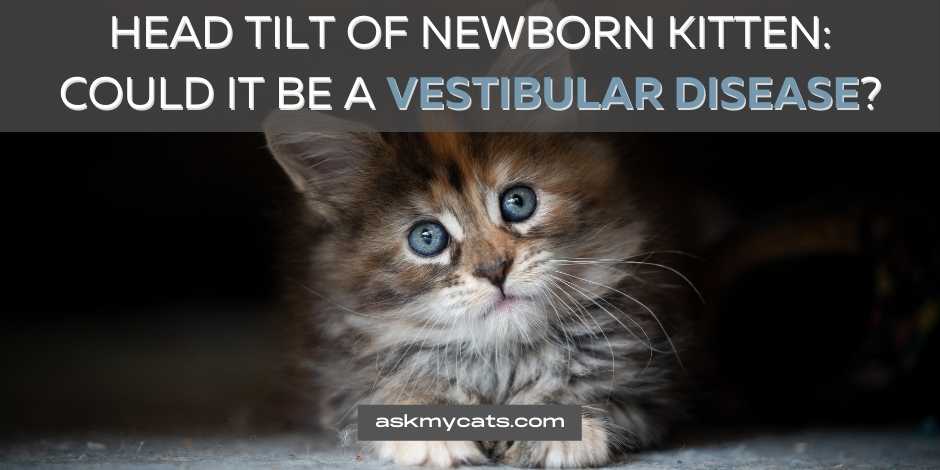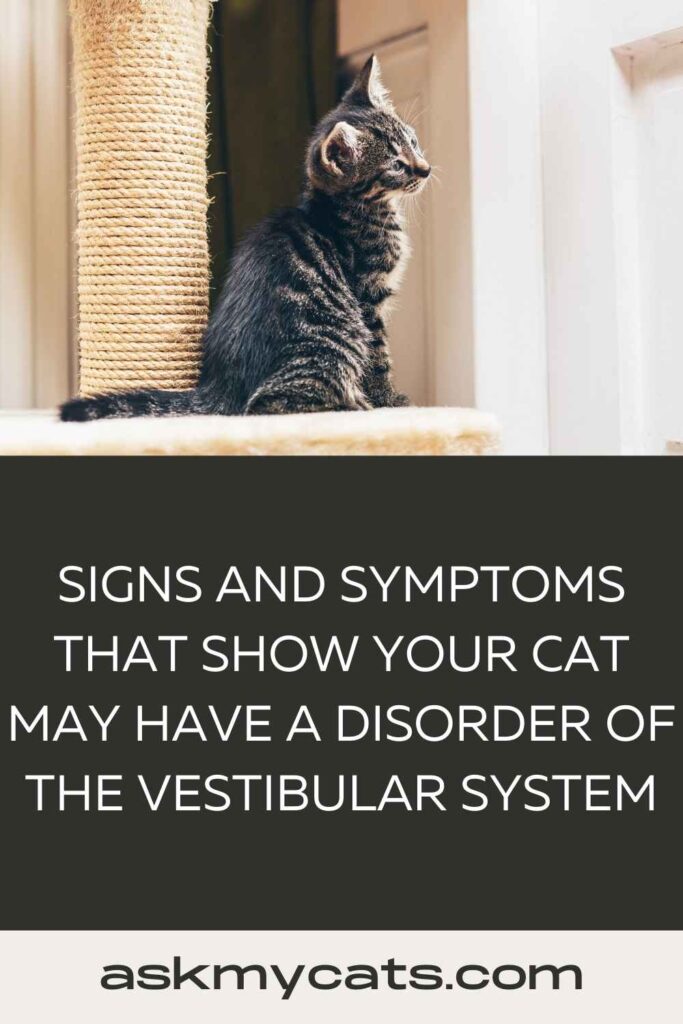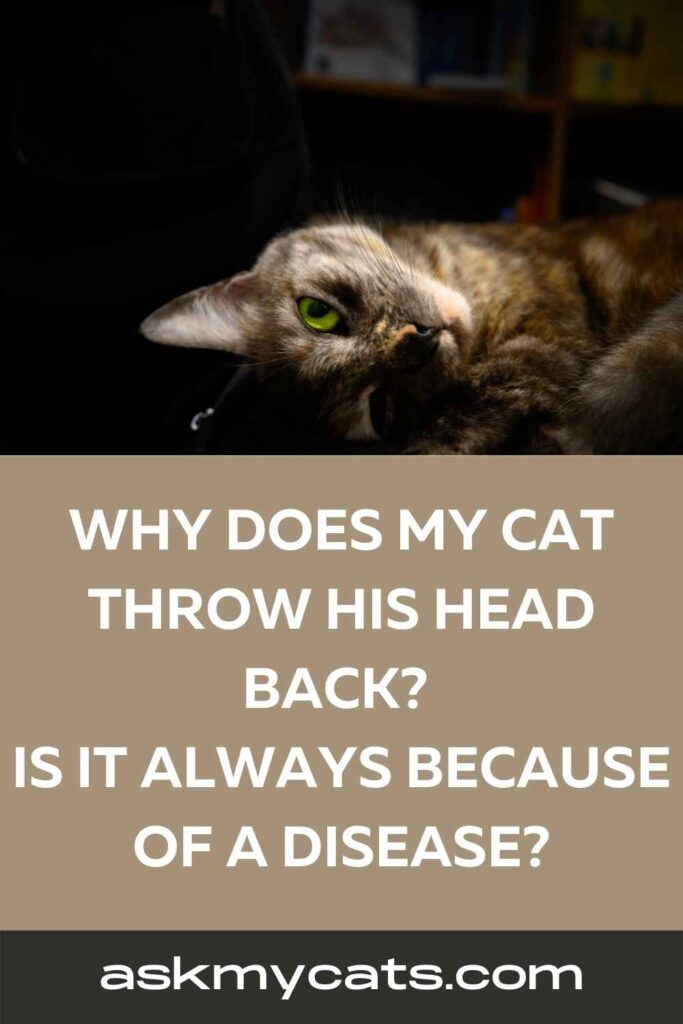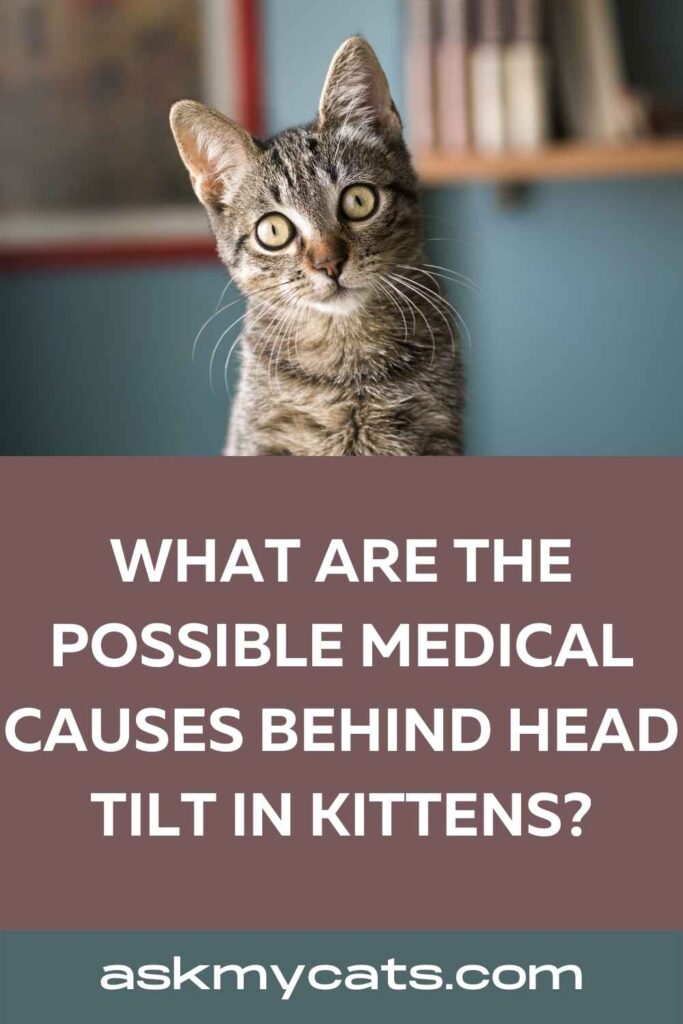Head tilt is a medical symptom that can be a sign of a significant underlying illness, most commonly of the vestibular system.
If a kitten repeatedly tilts its head to either side of the body (away from its alignment with the trunk and limbs), it is indicating that the kitten is feeling unbalanced. The kitten may even struggle to maintain a balanced position and tumble as a result.
Have you been noticing such head tilts or disorientation in your kitten or cat? Then you might want to read along as we see what are the symptoms to look out for, and when to see a vet ensure your kitten gets a right and timely diagnosis and treatment.


Give Your Cat the Perfect Day
Get the Free Ebook!
Why Is My Kitten Tilting Its Head?
Head tilting can be a symptom of something called Idiopathic Vestibular Disease. I know, this raises more questions than it answers. But don’t worry. We’ll look at everything in detail, going through one thing at a time.
What is a Vestibular System?
Let’s break things down to the basics before we dive into details of the disease and its symptoms, causes, or treatment.
The vestibular system is a sensory system situated in the inner ear of cats. It gives the cat’s body the information that is required for the cat to be able to stand upright and move around without feeling disoriented or out of balance.
Essentially, the vestibular system is the balance center of the cat’s body.
The vestibular system tells the cat’s body where it is in respect to the ground – whether it is upright or upside down, moving or at rest, and so on.
What is the deal with the Head Tilts?
Disorders of the vestibular system cause the cat’s body to get disoriented. Since it is the information center for the body’s balancing and motion, any problem in the vestibular system consequently causes a problem in the cat’s balancing, motion, as well as orientation.
Thus, if your kitten is tilting its head to one side in a recurring manner, it could be a sign of an underlying vestibular system disorder.
Signs and Symptoms That Show Your Cat May Have a Disorder of The Vestibular System
Consider how you feel when you’re feeling lightheaded. The world appears to be tilting, you feel sick, and you may be terrified to move. That is most likely how your cat or kitten feels if it has the vestibular condition.

If your kitten is holding its head at an angle, observe if it’s able to retain balance.
Your kitten may be suffering from vestibular syndrome if it is holding its head at an angle and has difficulty retaining its equilibrium. The vestibular syndrome is a rapid onset disorder.
Your cat may stumble, fall, droop to one side or tilt its head as a result. As it attempts to maintain its equilibrium, your cat’s eyes may move rapidly from one side to the other.
One of the earliest evident symptoms of vestibular dysfunction is head tilt.
The unusual angle at which your cat keeps its head upright is the most noticeable indication of vestibular dysfunction in cats. This head tilt can arise as a result of both inner ear and brain stem problems. Other vestibular syndrome symptoms may include the following:
- Lack of balance (ataxia)
- Uncoordinated movement
- Stumbling
- Walking in a circle
- Falling down
- Facial drooping
- Facial paralysis
- Strabismus (crossed eyes)
- Nystagmus (eyes moving up and down or back and forth)
- Nausea
- Vomiting
Why Does My Cat Throw His Head Back? Is It Always Because Of a Disease?

The good news is that a head tilt doesn’t always indicate an underlying medical condition. However, it is important to note how frequently your cat tilts its head.
If your cat is tilting its head very frequently, or constantly, and if it is showing any of the symptoms mentioned above along with the head tilting, you should immediately consult your vet.
Here are some nonmedical reasons behind your cat’s tilting head:
1. Your cat is attempting to track down the source of the noise.
This is one of the most common causes of your cat’s head tilt. Whether or not you heard the sound, it’s always likely that noises are occurring in your home that is outside the range of our feeble human hearing. That doesn’t mean your cat won’t be able to hear it.
Cats have incredible hearing. They can identify the sounds they detect by tilting their heads. This is especially true if the sound is difficult for them to recognize.
Cats use their ears to detect danger, approaching opponents, or prey. The head tilt notifies them to whether distant noises are originating from above or below. Noises coming from either side of them or straight ahead are considerably simpler for them to differentiate. Tilting their heads causes their ears to respond and aids them in determining the position of whatever they are hearing.
2. Your cat wants to hear what you’re saying.
I know, this feels a little too good to be true. Cats are often known for being solitary creatures who love to ignore their owners intentionally.
But every now and then, your cat genuinely wants to listen to what you’ve got to say. And sometimes, to hear you better, your cat may tilt its head. This will be especially noticeable when you’re either using an unusual tone or saying something unusual to your cat.
A cat’s ears are extremely sensitive and are utilized in much the same way as a satellite. If your cat hears a sound that is unusual, significant, or exciting to them, they will try to focus on it and figure out what is going on around them. It’s simply in their nature.
When it comes to their pet parents, even the most disruptive cats utilize their ears to detect what is being said to them and the tone in which it is being expressed.
3. Cats are very curious about their surroundings
Cat owners should not always read too much into the characteristic head tilt. It’s not unexpected to observe a cat’s head tilt when it’s very inquisitive about anything going on in its area.
Cats, like humans, bite their lips or frown automatically when they are captivated by something. If anything catches their interest, don’t be shocked if you notice their heads tilting.
4. It must be the annoying snout coming in your cat’s way!
We humans won’t be able to grasp the annoyance of having a snout on our faces, but our cats and dogs do. A big possibility is that your cat’s nose is getting in the way.
Both cats and dogs will bend their heads when they need to concentrate on something and their noses are in the way.
If you notice your cat looking at something while tilting its head side to side, it may be straining to see without its snout getting in the way.
I mean, let’s face it – if our noses came in our way every time, we tried to look at something, we’d be tilting our heads in every possible angle, too!
5. Your little furry buddy just wants to make you happy.
Yes, again, I know it sounds too good to be true considering the reputation that cats have of being high-nosed little monsters. But hey, let’s give them credit here!
Over the time of them living with their owners, cats learn to read their owner’s behaviors. They understand what makes their owners angry, happy, sad, worried, or excited.
So, if you have been getting really excited every time your cat tilted its head, it may have grown accustomed to your feelings. And sometimes, just to watch you get excited and happy, your cat may tilt its head for you.
P.S: yes, sometimes they might just tilt their heads to extort some treats and catnip from you.
Apart from these five nonmedical reasons behind your cat’s possible head tilts, there could be associated medical conditions.
So, if the tilting of the head happens too frequently and/or is happening with any of the symptoms listed above, schedule a visit to the vet.
What Are the Possible Medical Causes Behind Head Tilt in Kittens?

Vestibular symptoms can indicate difficulties in one of two main categories. The inner ear, where fluid levels in the cochlea indicate where your cat’s body should be with respect to the ground, is one example.
The medulla, which is a component of the brain, is the other section. The two systems work together to assist your cat find its way around.
Your cat’s head tilt may be an indication of a benign temporary abnormality in many circumstances. It may, however, suggest a dangerous underlying health issue.
Your cat requires immediate medical attention to determine the best and quickest solution to treat the problem. The following are the most typical causes of cat head tilt:
- Bacterial infections
- Inflammatory disease
- Reaction to drugs
- Polyps
- Tumors
- Cysts
- Cancer
- Idiopathic vestibular syndrome (no known reason)
- Ear injury
- Brain disease
- Metabolic diseases
- Neoplasia (abnormal tissue growth)
- Nutritional deficiencies (e.g., thiamine deficiency)
- Toxicity (e.g., use of toxic antibiotics in the ear)
- Inflammation of the central and inner ear canal due to bacterial, parasitic, or another type of infection
Diagnosis of Head Tilt or Vestibular Syndrome by the Vet: Here’s What to Expect
Your cat’s noticeable head tilt will be a primary symptom considered by your veterinary when determining the underlying cause of your cat’s medical condition. Additional diagnostic tests, examinations, and assessments that may be performed include:
1. Your Cat’s Complete Medical History
Your veterinarian will want a detailed account of your cat’s condition, including any odd behaviors or symptoms that were observed previous to the head tilt. This can include nausea, falling, difficulty in staying upright or maintaining equilibrium, etc.
2. A Thorough Physical Examination of Your Cat
Your veterinarian will need to do a comprehensive physical examination to discover the reason for the head tilt. This check-up may include observing your cat move about the examining room, collecting vital signs, and completing both an otoscopic (hearing) & cerebral exam.
3. Blood Tests
Blood testing will assist your vet in determining whether infections or inflammation are underlying the head tilt. Abnormal test findings assist your vet in understanding the main cause of your cat’s sensory issue.
4. Urinalysis
The veterinarian can examine your cat’s urine to determine whether there is anything odd in the test findings that might assist in determining the reason for the head tilt.
5. Your Cat May Need Advanced Tests
In certain circumstances, sophisticated imaging tests like magnetic resonance imaging (MRI) or computed tomography (CT) may be required to obtain an accurate diagnosis, especially if the disease appears to be deep within your cat’s ear or skull.
How Can My Kitten’s Head Tilt Be Treated?
Depending upon the medical examinations, your vet may take an approach for the treatment of the underlying cause that is causing the head tilt.
Head tilting is usually a symptom, not a cause. So, treating the underlying causes will help stop the tilting of your kitten’s head.
1. Idiopathic Vestibular Syndrome
If it is indeed idiopathic vestibular syndrome that is causing your kitten’s head to tilt to one side almost constantly, then the vet might suggest an approach to wait and see. Head tilting caused by idiopathic vestibular syndrome usually goes away on its own, and it seldom returns.
2. Infections or Inflammation
If the blood tests and other medical examinations suggest that the head tilt is being caused due to an underlying infection or inflammation, your vet will prescribe medicines. Depending on the underlying cause, ear drops and oral medication may be prescribed.
It is important to strictly follow the medication instructions and schedules prescribed by the vet to avoid any complications or side effects.
3. Polyps or Tumors
If the underlying cause of head tilts is known to be polyps or tumors, your vet may suggest surgery followed by a schedule of medication and follow-up checkups.
4. Drug Reactions
If your cat was already on some kind of medication before the head tilting began, your vet may change the prescription. If your cat has been vomiting along with tilting its head, your vet may suggest some tests to see if your cat needs additional hydration.
How Long Does Recovery of Head Tilt or Vestibular Syndrome Take?
The length of your cat’s healing will be determined by your veterinarian’s evaluation of the underlying cause of the head tilt. Even a mild ear infection will need follow-up sessions to verify the infection is under control and no more damage has happened within the cat’s ear.
Cats that have had surgery to correct the source of their head tilt require special care while they recover. Your vet will need to see your cat on a regular basis until it is fully recovered.
If your cat has significant vomiting in addition to the head tilt, your veterinarian may need to put your cat on IV drugs until the vomiting stops.
Most vestibular issues, thankfully, are very transient. While it may take two weeks or longer, the majority of cats recover completely from their sickness. Some cats may have a lingering head tilt. Most cats adjust well and resume normal activity, albeit with a somewhat altered perspective on the world.
Frequently Asked Questions
Why is my kitten’s head tilted?
Head tilt is a medical issue that can indicate a significant underlying problem, most commonly of the inner ear. A cat’s head tilting toward either side of the body (astray from its alignment with the trunk and limbs) indicates that the cat is feeling unbalanced.
Why does my cat tilt his head when he looks at me?
They can identify the sounds they perceive by tilting their heads. This is especially true if the sound is difficult for them to discern. Cats utilize their ears to detect danger, approaching opponents, or prey. The head tilt notifies them to whether distant noises are originating from above or below.
Why does my cat turn her head upside down?
Your cat is sleeping with its head turned upside down because it is more comfortable for them to do so. It suggests he is considerably more at ease at your house. A cat tucked up with its paws in a graceful sweep around its neck and its ears tucked in near to its chest is striving to maintain body heat. They’re guarding their essential organs as well.
Final Words
Your kitten’s head tilt is the least of his worries, but it presents various problems owing to his changed perception.
Vestibular illness impairs all aspects of coordination and can result in frequent falls and walking in circles. His eyes may dart back and forth swiftly, and this stress on his senses may result in nausea and vomiting. Many of the cats with this illness are also deaf.
The prognosis varies widely depending on the underlying condition. If the head tilt is caused by ear involvement, the odds of total recovery are rather good. Head tilt may persist in some circumstances.
You will take your cat to the veterinarian on a regular basis for check-ups. Follow treatment recommendations to the letter and provide drugs at the appropriate times and dosages.
One of the most avoidable pet mishaps is incorrectly medicating your pet. Furthermore, do not use your own medication or any medication that has not been prescribed by your veterinarian, especially in the ear, as this may exacerbate symptoms.
